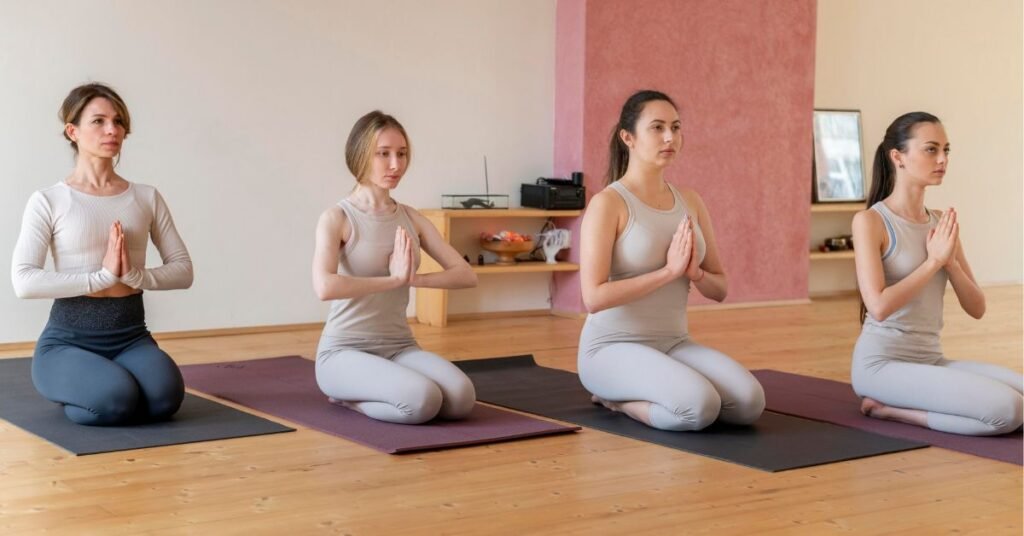Yoga is more than just stretching or bending into impressive poses; it’s a journey inward. It’s a practice that unites the body, mind, and spirit, helping you connect with something deeper within yourself. For many, yoga is not just about physical fitness but a spiritual path that leads to a more meaningful and balanced life. If you’ve ever felt like you’re missing a sense of purpose or inner calm, exploring the spiritual side of yoga could be exactly what you need.
In this blog post, we’ll dive into the spiritual path of yoga, uncover its benefits, and provide practical tips to help you integrate these ancient teachings into your modern life.
What Is the Spiritual Path of Yoga?
When most people think of yoga, they picture someone gracefully transitioning through poses like Downward Dog or Warrior II. While these movements, known as asanas, are an important part of yoga, they’re just one small piece of the puzzle. The spiritual path of yoga focuses on inner growth, self-awareness, and a connection to the universe.
At its core, yoga means “yoke” or “union.” It’s about bringing together the physical, mental, and spiritual aspects of yourself to achieve harmony. This path doesn’t belong to any specific religion; it’s universal and accessible to anyone willing to explore it.
The Eight Limbs of Yoga
The ancient sage Patanjali described yoga as an eightfold path in the Yoga Sutras. These Eight Limbs provide a roadmap for spiritual growth:
- Yamas (Ethical Principles): Non-violence, truthfulness, and self-control.
- Niyamas (Self-Discipline): Practices like contentment, cleanliness, and self-study.
- Asanas (Physical Postures): The poses we associate with yoga.
- Pranayama (Breath Control): Techniques to control and deepen your breathing.
- Pratyahara (Withdrawal of the Senses): Turning your focus inward.
- Dharana (Concentration): Training your mind to focus.
- Dhyana (Meditation): Achieving stillness and inner peace.
- Samadhi (Union with the Divine): A state of bliss and oneness with the universe.
The Eight Limbs serve as a spiritual guide for navigating life with mindfulness, compassion, and purpose.
Readmore: Exploring Different Types of Yoga
Readmore: How to Incorporate Yoga into Your Busy Schedule
Why Explore the Spiritual Side of Yoga?
In today’s fast-paced world, it’s easy to feel disconnected—from others, ourselves, and the present moment. The spiritual path of yoga offers a way to reconnect and realign. Here are some of the key benefits of exploring this deeper aspect of yoga:
1. Inner Peace
Practicing yoga helps quiet the constant chatter of the mind. When you focus on your breath or meditate, you create a space of calm where worries and stress can’t reach you. This sense of peace stays with you, even off the mat.
2. Improved Mental Clarity
The spiritual practices of yoga sharpen your focus and help you see things as they really are. You’ll find it easier to make decisions and handle challenges with a clear, calm mind.
3. Enhanced Self-Awareness
Yoga encourages you to look inward and reflect on your thoughts, emotions, and actions. Over time, this self-awareness helps you grow and evolve as a person.
4. Connection to Something Greater
Whether you call it the universe, a higher power, or your inner self, the spiritual path of yoga helps you feel connected to something larger than yourself. This connection can bring a sense of purpose and fulfillment to your life.
5. A Compassionate Heart
Yoga teaches kindness, empathy, and understanding—both toward yourself and others. When you embrace these qualities, your relationships deepen, and your interactions become more meaningful.
How to Incorporate the Spiritual Side of Yoga Into Your Life
You don’t need to live in a monastery or practice for hours every day to explore the spiritual side of yoga. Here are some simple ways to get started:
1. Start Your Day with Intention
Before you even get out of bed, take a moment to set an intention for the day. It could be something as simple as “I will approach today with kindness” or “I will stay present.” Setting an intention aligns your mind with your spiritual goals.
2. Practice Mindful Breathing
Breathing is a powerful tool for connecting with your inner self. Try this simple exercise: Inhale deeply for four counts, hold your breath for four counts and exhale for six counts. Repeat for a few minutes and notice how it calms your mind.
3. Embrace Meditation
Meditation doesn’t have to be complicated. Sit quietly, close your eyes, and focus on your breath or a mantra like “Om.” Start with just five minutes a day and gradually increase as you feel comfortable.
4. Incorporate Yoga Philosophy
Learn about the Yamas and Niyamas and try applying them to your daily life. For example, practice non-violence by speaking kindly to yourself or showing patience with others.
5. Join a Yoga Class or Community
Being part of a yoga community can deepen your practice and provide support. Many classes incorporate meditation, chanting, or discussions about yoga philosophy, making it easier to explore the spiritual side.
Readmore: Scorpion Pose (Vrischikasana)
Readmore: 5 Amazing Reasons to Try Hot Yoga
Misconceptions About the Spiritual Path of Yoga
Let’s address a few myths that might hold you back:
1. You Have to Be Flexible
Yoga is not about touching your toes; it’s about touching your soul. Flexibility comes with practice, but it’s not a requirement to start.
2. It’s Only for Certain Religions
Yoga is a spiritual practice, not a religious one. People of all beliefs (or no beliefs) can benefit from its teachings.
3. You Need a Lot of Time
Even a few minutes of mindful breathing or meditation each day can make a difference. Start small and build from there.
4. It’s Just for Women
Yoga is for everyone, regardless of gender, age, or background. The spiritual benefits are universal.
The Benefits of Combining Yoga and Spirituality
When you combine yoga’s physical poses with its spiritual teachings, you create a holistic practice that nurtures every part of you. Here’s how the two work together:
- Mind: Yoga clears mental clutter, making room for positive thoughts and creativity.
- Body: The physical practice strengthens and energizes your body, making it a better vessel for your spiritual journey.
- Spirit: The deeper teachings of yoga guide you toward self-discovery and inner peace.
Frequently Asked Questions
Q1. What if I’m completely new to yoga?
No problem! Yoga is for everyone, including beginners. Start with simple poses, mindful breathing, and basic meditation. The journey is about progress, not perfection.
Q2. Can I explore the spiritual side of yoga without doing physical poses?
Absolutely. While asanas are a part of yoga, you can focus on other aspects like meditation, pranayama, and studying the Yamas and Niyamas.
Q3. Do I need a specific space or equipment?
Not at all. A quiet corner and a comfortable surface are enough. Fancy gear is optional.
Q4. How often should I practice to see benefits?
Consistency is key. Even 10 minutes a day can make a difference. Build your practice gradually as it fits into your life.
Q5. Is yoga a replacement for therapy or medical treatment?
Yoga complements other forms of care but is not a substitute. Always consult a professional for medical or psychological concerns.
Readmore: The Ultimate Guide to 3-Person Yoga Poses
Readmore: Yoga Poses for 4 Persons
Final Thoughts: Embark on Your Spiritual Journey
Exploring the spiritual path of yoga is a deeply personal journey. It’s not about achieving perfection or mastering every pose; it’s about showing up with an open heart and mind. Along the way, you’ll discover the benefits of inner peace, self-awareness, and a greater connection to the world around you.
So, roll out your mat, take a deep breath, and begin. The path is yours to walk, one mindful step at a time.

Sonu is a passionate yoga teacher with over 6+ years of experience helping individuals find balance, strength, and inner peace through the transformative power of yoga. As the creator of Pure Yoga Vibes, Sonu shares expert insights, inspiring practices, and a wealth of knowledge to support your wellness journey. Dedicated to creating a space for growth and mindfulness, Sonu’s mission is to make yoga accessible and enjoyable for everyone. For inquiries or collaborations, feel free to reach out at contact@pureyogavibes.com.



